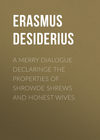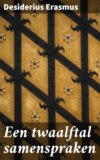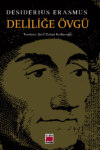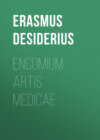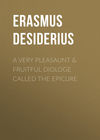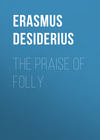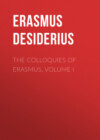Loe raamatut: «A Merry Dialogue Declaringe the Properties of Shrowde Shrews and Honest Wives»
A Merry Dialogue Declaringe the Properties of Shrowde Shrews and Honest Wives
Eulalia. God spede, & a thousand mine old acqueintāce. xantippa.
xan. As many agayn, my dere hert. Eulalia. me semets ye ar warē much faire now of late.
Eula. Saye you so? gyue you me a mocke at the first dash.
xan. Nay veryly but I take you so.
Eula. Happely mi new gown maketh me to loke fayrer then I sholde doe.
xan. Sothe you saye, I haue not sene a mynioner this many dayes, I reken it Englishe cloth.
Eu. It is english stuff and dyed in Venis.
xan. It is softer then sylke what an oriente purpel colore here is who gaue you so rich a gift.
Eu. How shoulde honeste women come by their gere? but by their husbandes.
xā. Happy arte thou that hathe suche an husband, but I wolde to god for his passyon, that I had maryed an husband of clowts, when I had maried col my good mā.
Eula. Why say ye so. I pray you, are you at oddes now.
xā. I shal neuer be at one wt him ye se how beggerly I go. I haue not an hole smock to put on my backe, and he is wel contente with all: I praye god I neuer come in heuen & I be not ashamed oftimes to shewe my head, when I se other wiues how net and trim they go that ar matched with farre porer mē then he is.
Eula. The apparell of honest wiues is not in the aray of the body, nor in the tirements of their head as saynte Peter the apostle teacheth vs (and that I learned a late at a sermon) but in good lyuynge and honest conuersacion and in the ornamentes of the soule, the cōmon buenes ar painted up, to please manye mennes eies we ar trime ynough yf we please our husbands only.
xan. But yet my good man so euyll wylling to bestow ought vpon his wyfe, maketh good chere, and lassheth out the dowrye that hee hadde with mee no small pot of wine.
Eulaly, where vpon?
xantipha, wheron hym lykethe beste, at the tauerne, at the stewes and at the dyce.
Eulalia Peace saye not so.
xan. wel yet thus it is, then when he cōmeth home to me at midnight, longe watched for, he lyeth rowtyng lyke a sloyne all the leue longe nyght, yea and now and thē he all bespeweth his bed, and worse then I will say at this tyme.
Eulali. Peace thou dyshonesteth thy self, when thou doest dishonesteth thy husbād.
xantip. The deuyl take me bodye and bones but I had leuer lye by a sow with pigges, then with suche a bedfelowe.
Eulali. Doest thou not then take him vp, wel favoredly for stūbling.
Xantip. As he deserueth I spare no tonge.
Eulalia. what doth he thē.
xantip. At the first breake he toke me vp vengeably, trusting that he shoulde haue shakē me of and put me to scilence with his crabid wordes.
Eula Came neuer your hote wordes vnto hādstrokes.
xantip. On a tyme we fel so farre at wordes yt we wer almost by ye eares togither.
Eula what say you womā?
xan. He toke vp a staffe wandryng at me, as the deuill had bene on hym ready to laye me on the bones.
Eula. were thou not redye to ron in at the bēch hole.
xanti. Nay mary I warrant the. I gat me a thre foted stole in hand, & he had but ones layd his littell finger on me, he shulde not haue founde me lame. I woulde haue holden his nose to the grindstōe
Eulalia. A newe found shelde, ye wanted but youre dystaffe to haue made you a speare.
xantip. And he shoulde not greatlye a laughed at his parte.
Eulali. Ah my frynde. xantyppa. that way is neither good nor godly,
xantippa what is neither good nor godly. yf he wyll not vse me, as hys wyfe: I wil not take him for my husbande.
Eulalya. But Paule sayeth that wyues shoulde bee boner and buxome vnto their husbandes with all humylytye, and Peter also bryngethe vs an example of Sara, that called her husbande Abrahame, Lorde.
xantippa. I know that as well as you thē ye same paule say that men shoulde loue theyr wyues, as Christ loues his spouse the churche let him do his duete I wil do myne.
Eula. But for all that, when the matter is so farre that the one muste forber the other it is reason that the woman giue place vnto the man,
xan. Is he meete to be called my husbāde that maketh me his vnderlynge and his dryuel?
Eula. But tel me dame xātip. Would he neuer offre the stripes after that
xātip. Not a stripe, and therin he was the wyser man for & he had he should haue repented euery vayne in hys harte.
Eulali. But thou offered him foule wordes plentie,
xantip. And will do.
Eula. What doth he ye meane seasō.
xantip. What doth he sometyme cowcheth an hogeshed, somtime he doth nothing but stande and laughe at me, other whyle takethe hys Lute wheron is scarslie three strynges layenge on that as fast as he may dryue because he would not here me.
Eula. Doeth that greue thee?
xantippa. To beyonde home, manie a tyme I haue much a do to hold my handes.
Eula. Neighbour. xantip. wylt thou gyue me leaue to be playn with the.
xantippa Good leaue haue you.
Eula. Be as bolde on me agayne our olde acquayntaunce and amite, euen frō our chyldhode, would it should be so.
xantippa. Trueth you saie, there was neuer woman kinde that I fauoured more
Elaly Whatsoeuer thy husbād be, marke well this, chaunge thou canst not, In the olde lawe, where the deuill hadde cast aboone betwene the man and the wife, at the worste waye they myght be deuorsed, but now that remedie is past, euē till death depart you he must nedes be thy husbande, and thou hys wyfe,
xan. Il mote they thryue & thei that taken away that liberty from vs
Eulalia. Beware what thou sayest, it was christes act.
Xā. I can euil beleue that
Eula. It is none otherwyse, now it is beste that eyther of you one beyng with an other, ye laboure to liue at reste and peace.
xantyppa. Why? can I forgeue him a new,
Eu. It lieth great parte in the womē, for the orderinge of theyr husbandes.
xan. Leadest thou a mery life with thine.
Eula Now all is well.
xan. Ergo ther was somwhat to do at your fyrste metying
Eula. Neuer no greate busynes, but yet as it, happeneth now and than betwene man & womā, there was foule cloudes a loft, that might haue made a storme but that they were ouer blowen with good humanitie and wyse handlynge. Euery man hath hys maner and euery mā hath his seueral aptite or mynde, and thinkes hys owne way best, & yf we list not to lie there liueth no mā without faulte, which yf anie were elles, ywis in wedlocke they ought to know and not vtterly hated
